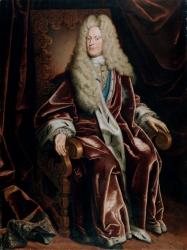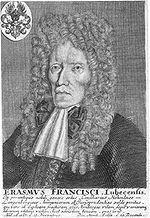
1633 - 1714 Person Name: Anton Ulrich von Braunschweig-Wolfenbuettel Hymnal Number: aad411 Author of "Nach dir, o Herr, verlanget mich mein Gott ich denke" in Erbauliche Lieder-Sammlung zum Gottesdienstlichen Gebrauch in den vereinig-ten evangelisch-lutherischen Gemeinen in Pennsylvania ... 6. Aufl. Anton Ulrich of Brunswick, born Oct. 4, 1633, at Hitzaeker, on the Elbe above Lauenburg, the portion as younger son of his father, Duke August, who three years afterwards succeeded to the Dukedom of Wolfenbuttel. He was the only child of the Duke's second marriage. In 1635 the Duke contracted a third marriage with Sophie Elisabethe of Mecklenburg. Father and stepmother alike were pious and fond of music and poetry, and their children were trained with a simple home life, in Lutheran orthodox ; and, under J. G. Schottelius and Sigismund v. Birken, instructed in all the learning of the time. Under these influences, supplemented by a residence at the University of Helmstädt, 1650, Anton Ulrich grew up a lover of his mother tongue and of poetry—his first literary efforts being a number of hymns which he presented in manuscripts to his father as a New Year's gift, 1655. In 1659 he was admitted a member of the Fruitbearing Society. At the death of his father in 1666 the family circle was broken up, and, released from the healthful, if somewhat narrow, influences of his training and previous surroundings, he turned from hymn-writing to the affairs of the world. Henceforth the ruling passion, hitherto curbed, took the upper hand, and the desire for power and fame led him far astray.
In 1667 his elder brother appointed him Governor at Wolfenbuttel, and in 1685 made him Co-Regent of the Duchy of Brunswick. His desire for princely magnificence, fostered by a year's residence in France, led him into lavish expenditure, such as an imitation of the Palace of Versailles which he built at Salzdahlum, near Wolfenbuttel, and in Wolfenbüttel an Academy (opened 1687) for the education of young noblemen; a fine building for the Library, and a new opera house. Envious at the rapidly increasing power of the Hannover-Celle branch of the Wolfenbüttel line, he made alliance, in 1702, with France, against them, only to be deposed from the Co-Regency, although when his brother abdicated in 1704 he obtained full sway in Brunswick. By his secession to the Roman Catholic Church in 1709-10 (one of the results arising from the marriage of his granddaughter Elizabethe Christine to Charles of Spain, who was crowned Emperor in 1711), he lost the love of his subjects and the respect of his former princely friends, and attained neither temporal advantage, nor spiritual peace. When his fatal illness came on and he felt his end near, he summoned an Evangelical clergyman to prepare him for death, then received the Sacrament according to the Roman rite, and after giving his surviving children his blessing, died at Salzdahlum, Mar. 27,1714. His two sons succeeded each other, but as they died without male issue, the Dukedom passed to a son of his younger brother by Duke August's third marriage.
His hymns seem to have been mostly written before 1655, and were printed anonymously to the number of 44 as Hocherleuchtete Geistliche Lieder, Finer hohen Personen, N.P. 1665, and then enlarged to 60, and with melodies probably by his stepmother as:— Christ Fürstliches Davids-Harpfen-Spkl zum Spiegel und Fürbild Himmel-flammender Andacht, &c, Nürnberg, 1667, with a preface on prayer, probably by J. G. Schottelius (reprinted with three hymns added, Wolfenbüttel, 1670). Of these 34 are included in the selections by H. Wendebourg from the Duke's Geistliche Lieder, published at Halle, 1856. Mostly composed before his 22nd year, many are in unusual metres and of the nature of experiments in verse, showing him as allied with the Pegnitz Order, of which his former tutor and life-long friend Sigismund v. Birken (q. v.) was then President or Chief Shepherd. But although it may be said that the Duke's hymns are often too subjective and farfetched, and that his after life did not altogether fulfil the promise of his youth; yet there cannot be denied to them the expression in beautiful form of a deep sense of sin, an ardent longing for grace, and a heartfelt love to the Saviour. Their poetic worth, simplicity of diction, and practical usefulness gained them admission to the Leipzig Vorrath, 1673, the Nürnberg Gesang-Buch, 1676, and other hymn-books of the period, and to Bunsen's Versuch, 1833, and other recent collections (Koch, iii. 537-549; Wendebourg's Preface; Allgemeine Deutsche Biographie, i. 487-491; Bode, 37-38). Four have been translated into English, two first published 1665, and two first published 1667; the references to the original editions being kindly supplied from the copies in the Ducal Library at Wolfenbüttel by the Principal Librarian, Dr. O. v. Heinemann.
i. Lass dich Gott. [Resignation.) This beautiful hymn on Consolation in Trial appeared in 1667, p. 237, as above (ed. Wendebourg, 1856, p. 68), in 6 stanzas of 6 lines, lines 1, 6, of each stanza being identical. Included as No. 468 in pt. ii., 1714, of Freylinghausens Gesang-Buch, and as No. 787 in Bunsen's Versuch, 1833 (Allgemeine Gesang-Buch, 1846, No. 319). Translated as:—
Leave all to God. A good translation (omitting stanza iv.) by Miss Winkworth in the 1st Series, 1855, of her Lyra Germanica, p. 159 (ed. 1876, p. 161), and thence as No. 155 in Psalms & Hymns, Bedford, 1859, as No. 302 in the Free Church Hymn Book, 1882, and in the Gilman-Schaff Library of Religious Poetry, ed. 1883.
ii. Nach dir, 0 Gott! Verlanget mich. [Thirsting for God.] One of his best hymns. Appeared in 1665, p. 21, 1667, p. 28, as above (ed. Wendebourg, 1856, p. 8), in 11 stanzas of 4 lines. Included as No. 1129 in the Leipzig Vorrath, 1673, and as No. 1259 in Burg's Breslau Gesang-Buch, 1746. Translated as:—
0 God, I long Thy Light to see. A good translation by Miss Winkworth in the 1st Series, 1855, of her Lyra Germanica, p. 145, omitting stanzas ii., iii., vi. In the second ed. p. 146, translation of stanzas ii., iii were added. Repeated thus as No. 118 in her Chorale Book for England, 1863.
Other translations are, all omitting stanzas ii., iii., vi., (1)"0 Lord! I long Thy face to see," by Miss Cox, 1841, p. 97 (1864, p. 115); (2) "My soul is thirsting, Lord, for Thee," by Lady Eleanor Fortescue, 1843 (1847, p. 38); (3) "Call me, O God; I come; for I," by Dr. G. Walker, 1860, p. 77.
iii. Nun tret ich wieder aus der Ruh. [Morning. For the Sick.] Appeared in 1667, p. 2, as above (ed. Wendebourg, 1856, p. 1.), in 8 stanzas of 8 lines.
The translations are, (1) "Once more from rest I rise again," by Miss Winkworth, 1855, p. 220 (1856, p. 222). (2) "From blest, unconscious sleep I wake again," by Miss Cox, 1864, p. 185.
iv. Wer Geduld und Demuth liebet. [Patience and Humility.] Appeared in 1665, p. 92, and 1667, p. 135, as above (ed. Wendebourg, 1856, p. 43), in 11 stanzas of 4 lines. Translated as Patience and Humility, by Miss Winkworth, 1869, p. 225. [Rev. James Mearns, M.A.]
-- John Julian, Dictionary of Hymnology (1907)
Anton Ulrich


